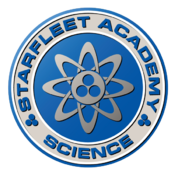Starfleet Academy Division of Arts & Sciences/Planetary Sciences: Difference between revisions
Jump to navigation
Jump to search
| Line 26: | Line 26: | ||
* '''PSD320: Geomechanics''' | * '''PSD320: Geomechanics''' | ||
** Introduction to continuum mechanics: elasticity, fluid dynamics, diffusion, porous flow, multiphase flow, dimensional analysis, and natural convection. Example applications: earthquakes and rock mechanics, flow of glaciers, slope stability, debris flows, groundwater flow, contaminant transport, flow in rivers and channels, mantle and magma convection. Students are required to either have taken, or be concurrently enrolled in, PHYS225, MATH211 and MATH332. | ** Introduction to continuum mechanics: elasticity, fluid dynamics, diffusion, porous flow, multiphase flow, dimensional analysis, and natural convection. Example applications: earthquakes and rock mechanics, flow of glaciers, slope stability, debris flows, groundwater flow, contaminant transport, flow in rivers and channels, mantle and magma convection. Students are required to either have taken, or be concurrently enrolled in, PHYS225, MATH211 and MATH332. | ||
* '''PSD325: Geophysics''' | |||
** Introduction to geophysical methods including refraction and reflection seismology, gravity, magnetics, electrical resistivity, heat flow, and geodesy. Laboratory exercises explore interpretation of geophysical data to determine elastic wave speed, density, magnetic susceptibility, and electrical conductivity at depth. Students are required to either have taken, or be concurrently enrolled in, PHYS225, MATH211 and MATH332. | |||
* '''PSD425: Physical Processes of non-M-Class Planets''' | * '''PSD425: Physical Processes of non-M-Class Planets''' | ||
** A continuation of topics discussed in PSD225, with applications of those subjects on non-M-Class planets. In addition, crystallography, crystal chemistry, and characteristics of rock-forming and ore minerals will be discussed. In addition to PSD225, students are required to either have taken, or be concurrently enrolled in, CHEM422 | ** A continuation of topics discussed in PSD225, with applications of those subjects on non-M-Class planets. In addition, crystallography, crystal chemistry, and characteristics of rock-forming and ore minerals will be discussed. In addition to PSD225, students are required to either have taken, or be concurrently enrolled in, CHEM422 | ||
* PSD430: Global Tectonics | |||
** A continuation of PSD220, with an introduction to large-scale plate tectonics processes and observations including motions on a sphere, polar-wander paths, plate-boundary seismicity, focal mechanisms, gravity, magnetics, and heat flow. Also includes observations and theories of plate deformation and continental dynamics. Case studies will be made on instructor selected Federation worlds. | |||
Revision as of 00:46, 3 May 2019
| Academy Library |
|---|
Planetary Sciences DepartmentThe scientific study of planets, moons, and planetary systems (in particular those of the Solar System) and the processes that form them. It includes geology, hydrology, meteorology, climatology, ecology and oceanography, among others.
|
| Academy Course Catalogue |
|---|

